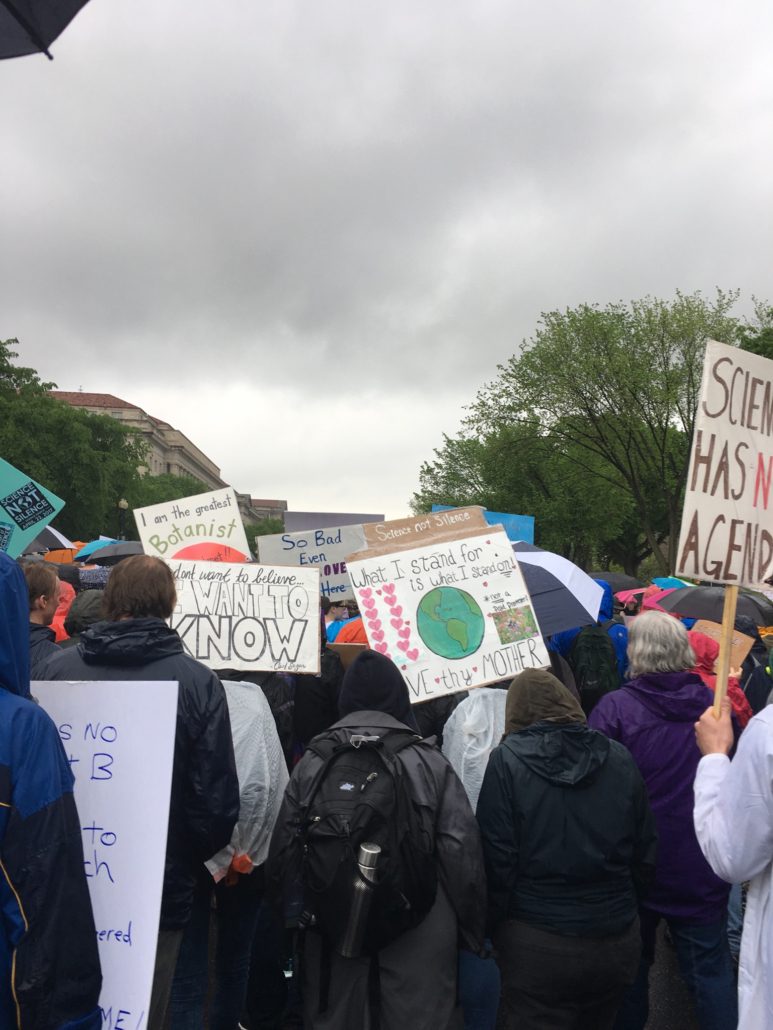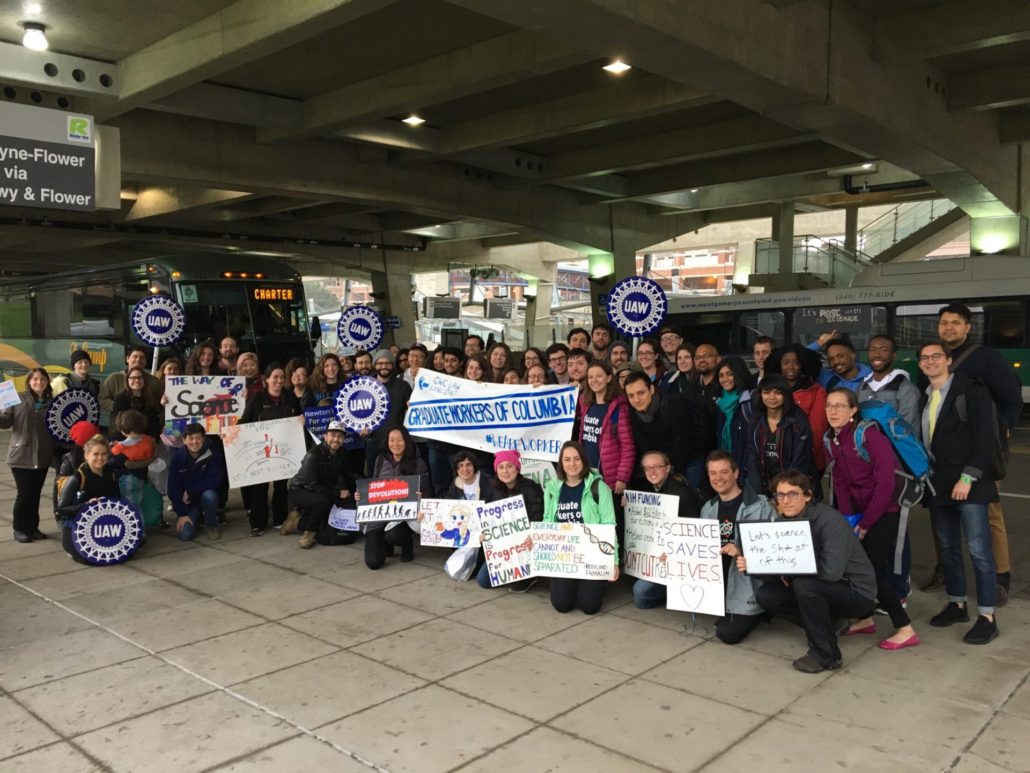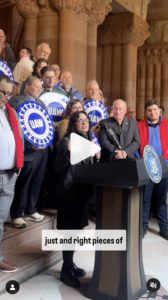Tag Archive for: Local 2110
New York, NY – On Thursday, June 6, staff at the American Folk Art Museum will vote on whether to unionize with Local 2110 UAW. The wall-to-wall unit includes curators, retail staff, educators, IT, communication staff, and others. The Museum is the latest in a growing movement of museum workers to organize.
Staff members cite lack of transparency and a desire for fair wages, benefits, recognition, and sustainable working conditions as reasons for unionizing.
“I love the Museum, its exhibitions and programs,” Jean Seestadt, Manager of Events, says, “but I want employment here to be sustainable over a longer period. We’ve seen too many great colleagues leave.”
Eve Erickson, Executive Assistant, adds: “The staff are an important part of the Museum and by unionizing, we have a voice in our own conditions of work and our future at the Museum.”
The last few years have seen thousands of workers in cultural institutions decide to unionize. Employees at the Jewish Museum, The Dia Foundation, the Guggenheim Museum, Whitney Museum of American Art, the Brooklyn Museum, the Hispanic Society of America, Film Forum, Anthology Film Archives, MASS MoCA, Film at Lincoln Center, Studio in a School, the Portland Museum of Art, and the Museum of Fine Arts, Boston voted to unionize with Local 2110 since November 2020. Many reference similar issues of low pay, and lack of job security or opportunity.
The American Folk Art Museum, located at 2 Lincoln Square on the Upper West Side has existed for over fifty years.
Local 2110 UAW also represents workers at the Museum of Modern Art, the Guggenheim, the Museum of Fine Arts, Boston, MASS MoCA, the Whitney Museum of American Art, the Brooklyn Museum, Columbia University, Film Forum, Teachers College, ACLU, Center for Reproductive Rights, The New Press, and many more. The union has a reputation for its successful organizing and bargaining.
NORTH ADAMS, MA — Unionized employees of MASS MoCA will go on strike starting Wednesday, March 6 if no agreement on wages is reached with the Museum before then. Employees will begin picketing the Museum starting 8 am on Wednesday, March 6 and will picket daily until an agreement is reached.
The employees’ union, part of Local 2110 UAW, was originally formed in April of 2021. After a one day strike in August of 2022, employees reached an agreement on a first contract which allowed them to re-open the agreement in October 2023 to negotiate further wage increases. Negotiations on the wage reopener have been ongoing for four months but no agreement has been reached.
Fifty-eight percent (58%) of the 120 employees are earning just $16.25 per hour. Average pay for full-time employees is $43,600. According to The Economic Policy Institute’s family budget calculator, for a modest living in Berkshire County, a single individual with no children needs to earn approximately $47,000 per year while a family of four needs about $118,000. The Union is seeking to raise the hourly minimum rate to $18.25 by October of 2023 and is also seeking a minimum 4.5% increase this year.
MASS MoCA sent out a March 1 email to union members characterizing its rejection of the Union’s offer: “The Museum cannot agree to terms that will diminish our mission or operational sustainability, upend vital partnerships, reduce our programs, or fundamentally change our creative workplace culture. Simply put, MASS MoCA has been and will continue to be moved to adopt proposals that are balanced, fair, sustainable, and honest.”
The Union says the difference between its and the Museum’s base wage proposal is only an additional $150,000 for this year, and that workers need the money just to make ends meet. Moreover, the Union asserts that the Museum has increased the number of higher-paid management positions at the expense of the unionized staff.
“MASS MoCA seems out of touch with our needs and concerns as employees,” said Meg Labbee, a 25 year employee of the Museum who works in Artists Services. “They say the arts and artists come first but they need to show some regard for the people who work here. We love the work, but we deserve respect and fair conditions.”
Labbee, who is from the nearby town of Adams, adds, “Many of us live locally and our pay has not kept pace with the cost of living. By raising pay to something more livable, MASS MoCA would not only be supporting its employees, but helping lift the community, MASS MoCA’s rejection of our reasonable proposal has left us with no choice but to strike the institution we love.”
The March 6 strike deadline is not the first time bargaining with the Museum has been contentious. In 2022, during initial contract bargaining, the Union filed unfair labor practice charges with the National Labor Relations Board over the Museum’s bad faith bargaining, and employees engaged in a one-day strike. Then, this past November, the Union filed a complaint against the Museum with the Occupational Safety and Health Administration (OSHA) when the Museum ordered workers to remove flooring contaminated with loose asbestos without proper equipment or training. OSHA has since issued test results confirming the presence of asbestos, cited necessary corrections to the Museum and is conducting an ongoing investigation.
In April 2021, the MASS MoCA staff voted overwhelmingly to unionize with UAW Local 2110. The bargaining unit includes approximately 120 employees who work as educators, curators, custodians, museum attendants, box office staff, art fabricators, technicians, and other administrative and professional staff. UAW Local 2110 is a technical, office and professional union that represents many museums and cultural institutions in the northeast including the Museum of Modern Art, the MFA, Boston, the Portland Museum of Art, the Whitney Museum of American Art, the Guggenheim, the Jewish Museum, the Harriet Beecher Stowe Center, the Brooklyn Academy of Music, and other non-profit and educational institutions.
UAW WELCOMES BROOKLYN ACADEMY OF MUSIC EMPLOYEES
UAW ADDS OVER 14,000 NEW MEMBERS SINCE AUGUST 2018
Eighty-two percent of workers at the Brooklyn Academy of Music voted to join the UAW last week joining UAW Local 2110.
The administrative and cinema workers will now be able to bargain following reductions in benefits such as health care and 401(k) matching, and conversion of full-time jobs to part-time jobs among other issues. The 145 employees petitioned for an election in April.
“We are here because we believe in BAM’s mission,” Jesse Trussell, a film programmer who helped organize at BAM, said on Twitter when petitions were filed. “Our union will make BAM stronger, more democratic and more sustainable.”
Trussell said that BAM administrative staff needs a “powerful voice” and said workers were inspired by similar successful campaigns at the Tenement Museum and the New Museum.
The Workers Defense League in New York recently honored UAW Local 2110 Maida Rosenstein during the group’s 81st anniversary dinner May 16. Rosenstein has always given priority to organizing new workers. She has been involved in graduate worker campaigns at New York University and Columbia, at a host of nonprofits and museums, and in higher education. For more than 30 years, she has strongly promoted membership-led, grassroots union activity, in contract negotiations campaigns, new organizing and political action. As a result, Local 2110 has developed a broad group of leaders, and a degree of mobilization and activity that stands out within the labor movement.
Rosenstein’s first successful strike was in high school when she led a “pants strike” to force the school to allow girls to wear pants. She and her classmates were reprimanded and sent home, but a week later the rules were changed and girls were allowed to wear pants to school. The strike taught her that collective action was a potent weapon in promoting women’s rights.
After receiving a degree in art from Rutgers University, she became a university clerical worker, and in 1981 she joined District 65 UAW’s organizing committee at Columbia University. The goal was to organize 1,100 clerical workers, and the campaign, which brought together her feminist views and her commitment to workers’ rights, was a tough one. There were years of legal delays and a vicious anti- union campaign in which the university claimed that the union would interfere with the highly personal relationship between a secretary and her boss. She learned the basics of organizing and the drive was transformative for her. After the union won the election in 1983, she became a fulltime organizer and ultimately was elected as vice president and then president of UAW Local 2110 (the successor to the District 65 Technical, Office and Professional Division).
Rosenstein serves as the vice chair of the UAW New York State Political Action Council and is chair of the UAW International Advisory Council on Technical, Office and Professional Workers. She is also elected to the New York State Committee of the Working Families Party.
Other honorees included Robert Martinez Jr., president of the International Association of Machinists and Aerospace Workers and James Slevin, president of Local 1-2, Utility Workers Union of America.
Photo by Sarah Joseph
On Saturday, Earth Day, tens of thousands of people participated in the March for Science at the National Mall in Washington, D.C., and numerous other cities across the U.S. Among the participants in Washington were hundreds of UAW members who rallied behind the mission of the event and spent the day celebrating science.

The passionate crowd gathered to generate a conversation about the alarming trend toward discrediting facts and scientific consensus, and restricting scientific discovery.
Sarah Joseph, a UAW Local 2110 member from the Department of Genetics at Columbia University, had a very personal reason for participating in the March for Science. “I march because without science I would not have been born. I was conceived through IVF (in vitro fertilization), and I march because without science many of my family members would not be alive today.
“I am participating to raise awareness for science and to dispel the misconception that there is such a thing as ‘your’ facts. Facts are facts. It is the interpretation of facts that is up for debate,” said Joseph.
The March for Science champions and defends science and scientific integrity, but it is a small step in the process toward encouraging the application of science in policy. March for Science organizers and participants say the best way to ensure science will influence policy is to encourage people to appreciate and engage with science. That can only happen through education, communication and ties of mutual respect between scientists and their communities — the paths of communication must go both ways. There has too long been a divide between the scientific community, the public and the politicians who represent them.

“I’m marching because I think it’s immoral for politicians to deny the basic fact of climate change when they have the chance to change that,” said Catherine Braine, a UAW Local 2110 member from the Department of Neurobiology and Behavior at Columbia University.
“I am also a graduate student whose research is funded by NIH (National Institutes of Health), the organization the Trump budget wants to cut by 20 percent,” Braine added. “It’s important for everyone to be involved because everyone should push for policies that acknowledge objective reality and seek to be responsible guardians of the Earth.”
As debates continue in Washington over funding of science, Saturday’s event sent a very clear message to politicians: Back up your reasons for doubting scientific evidence and, more important, back off science funding!
UAW-NYU Graduate Employees Approve Only Contract Covering Private Sector Graduate Employees
The United Auto Workers announced today the ratification of the contract with New York University which covers over 1200 graduate employees,
members of the Graduate Student Organizing Committee-UAW Local 2110, who perform various functions for the university including teaching and research. Once again, this makes NYU the only private university in the country with a unionized graduate employee workforce. The agreement was ratified by 99% of the membership, with nearly 1,000 members voting.
“This contract is a major step forward for our members,” said Julie Kushner, Director of UAW Region 9A. “They did not back down after being stripped of their bargaining rights in 2005.Their commitment to justice will have a huge impact on the working lives of teaching and research assistants throughout the university. This victory has already inspired other private sector graduate employees to organize.”
The agreement made substantial gains in wages, health care, including a 90% subsidy towards individual coverage and first time support for dependent coverage, childcare benefits and tuition waivers. In addition, it doubles the starting wage to $20 per hour over the life of the five-year agreement for workers at NYU’s Polytechnic School of Engineering, who perform and support cutting edge research. (Greater detail is appended below.)
“This contract will make a real difference in our lives here at NYU, and will raise the bar for private sector graduate working people nationally,” said Lily Defriend, a Ph.D candidate in the Anthropology Department. “Right here in New York City our campaign and this contract win have contributed to graduate employees at Columbia and The New School organizing at the UAW.”
After being the first group of private university graduate workers to successfully unionize in 2000, the UAW won a groundbreaking contract at NYU. In 2005 the university withdrew recognition, hiding behind a Bush-era NLRB decision stripping graduate employees of the right to collective bargaining. Undeterred, the workers at NYU fought an eight year battle for recognition and the university agreed to recognize the UAW once again subject to an election, in which they remained neutral, conducted by the American Arbitration Association. The workers voted 98.4% in favor of being represented by the UAW in December 2013.
The UAW represents more than 45,000 academic workers across the U.S., including graduate employees at the University of Massachusetts, University of Connecticut, University of Washington, University of California and California State University.






UAW Statement on the Republicans’ Anti-Worker Budget Reconciliation Bill
BOSK Workers Call on NLRB to Step In: “We Deserve a Fair Shot at a Union Vote”
UAW Statement on New York Mayoral Primary Race